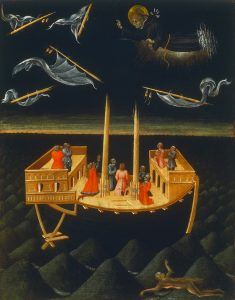Francine Prose at Lapham’s Quarterly:
 If, as one sometimes hears, people can be divided into two groups—those who run away from violence and danger and those who run toward it—something similar could be said about ones who, like Brassaï and Caravaggio, see themselves as nocturnal beings, as opposed to those who see themselves as creatures of daylight, or even identify with that loaded appellation morning person. Some, like Sancho Panza, wish only to go to bed at twilight and to sleep undisturbed—escaping the real and imagined terrors that they perhaps sense lurk in the dark. Others, like Don Quixote, feel the compulsion to stay awake for at least part of the night, to maintain a vigil.
If, as one sometimes hears, people can be divided into two groups—those who run away from violence and danger and those who run toward it—something similar could be said about ones who, like Brassaï and Caravaggio, see themselves as nocturnal beings, as opposed to those who see themselves as creatures of daylight, or even identify with that loaded appellation morning person. Some, like Sancho Panza, wish only to go to bed at twilight and to sleep undisturbed—escaping the real and imagined terrors that they perhaps sense lurk in the dark. Others, like Don Quixote, feel the compulsion to stay awake for at least part of the night, to maintain a vigil.
Still others feel that, like the vampires and werewolves a daylight lover may fear, they only really come alive when the lights go out. The thieves and murderers who ply their trade through the pages of this issue can do so only under cover of darkness, and so, as Juvenal and Italo Calvinoremind us, more crimes are committed during those blackened hours. Night is said to be Satan’s favorite time; one only has to read John C. Norris’ 1871 account of the nocturnal terrorism of the Ku Klux Klan to be mostly convinced of this.
more here.
